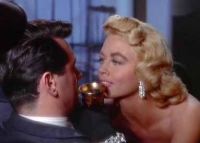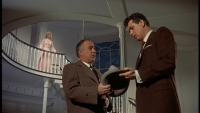Is It Really a Great Movie? Part Five: Written on the Wind
by dan heaton
Using Roger Ebert's Great Movies book as a guide, this series of articles will focus on all films included on his list that previously have escaped my notice. Since all lists are subjective, I am not treating Ebert's choices as the essential selection of films. However, his essays offer the perfect chance for me to explore both classics and lesser-known pictures from around the globe.

Douglas Sirk’s Written on the Wind has received wide acclaim for its over-the-top melodrama within a rich, extravagant setting. Along with its inclusion in the Great Movies list, it also appeared in The A List: The National Society of Film Critics' 100 Essential Films. Dorothy Malone won the 1957 Oscar for Best Supporting Actress, and Robert Stack received a nomination for Best Supporting Actor. Douglas Sirk’s reputation has increased significantly since he retired from Hollywood in 1959. Legendary directors Jean-Luc Goddard and Rainer Fassbinder loved his work, and many experts have praised Sirk’s nasty dissection of the conformist attitudes of 1950s’ America.
Written on the Wind begins with the unexplained shooting and possible death of a mysterious man in front of a large mansion. In similar fashion to Sunset Boulevard, we flash back several years to discover the events leading to this fateful day. The story begins with the meeting of the handsome Mitch Wayne (Rock Hudson) and the striking Lucy Moore (Lauren Bacall), who seem primed for a romance. However, the arrival of the arrogant, rich Kyle Hadley (Robert Stack) complicates matters. Taking Lucy for a flight on his private plane, the oilman charms her and begins a brief courtship. Within a short time, they get married, which saddens the loyal, but conflicted Mitch. Kyle has been his best friend since childhood, but his feelings for Lucy are difficult to deny. Complications ensue with the arrival of Kyle’s wild sister Marylee (Dorothy Malone), who longs for Mitch and will do anything to win his attention. Describing herself as “allergic to politeness,” Marylee is the self-absorbed wild card that drives the family towards its sad finale.
This short description cannot do justice to the ridiculous plot machinations that make Written on the Wind a nearly unbearable experience. The trashy dialogue is awful and sounds even worse when combined with some crazy overacting. Robert Stack’s drunken ramblings are completely unbelievable and would even fail in modern junk like Melrose Place or Desperate Housewives. He stumbles over furniture, slurs his words, and uses every other obvious tactic to distract us from everything else on screen. His initial meeting with Lucy contains zero chemistry and makes him appear to be a complete idiot. Creating Kyle as a worthy adversary for Mitch would have at least generated some tension about her feelings.

Another problem is the wooden acting from Rock Hudson and Lauren Bacall that fails to bring any compassion to their situation. Bacall can be lively with better material, but she drains the energy out of the screen with each appearance. Hudson’s stale acting is more understandable given his character’s gloomy state, but this lack of life keeps us from identifying with him. Dorothy Malone at least has fun with the role, particularly during her famed sexy dance while her father struggles up the steps to chastise his impure daughter. This scene’s laughable outcome provides one of the film’s most outlandish, maddening scenes. Malone can’t truly sell her evil actions as believable, but she does add energy to a mostly humdrum picture.
Roger Ebert believes that viewers need considerable sophistication to recognize the subversive charms of Written on the Wind. Unfortunately, this approach lets Sirk and writer Robert Wilder off the hook for crafting a bloated, poorly written melodrama. The bright, obviously fake sets create a dreamlike experience, but the characters are too dull to match this original style. During one pivotal scene, Marylee stands by the river and hears the voices from a childhood moment that could explain her current state. But the execution falls short and instead leads to another bizarre moment. Instead of providing an emotional revelation, the voices feel silly due to the glossy environment. I expect that my reaction would have been much different in 1956. Viewed during the final years of Hollywood’s Golden Era, this story would have felt subversive and been more effective. Instead, Sirk’s over-the-top style appears dated and only works as shallow, star-driven entertainment.
Copyright (c) 2006 erasing clouds |
|